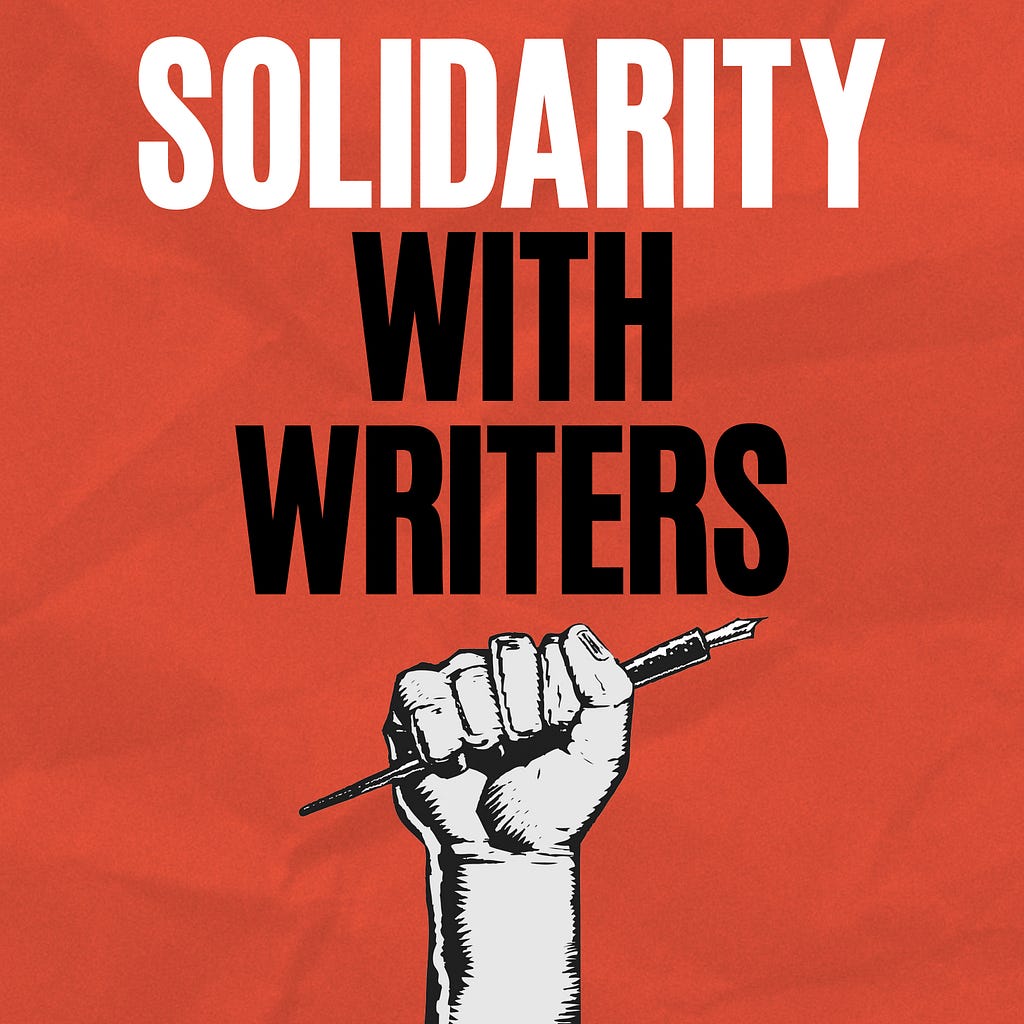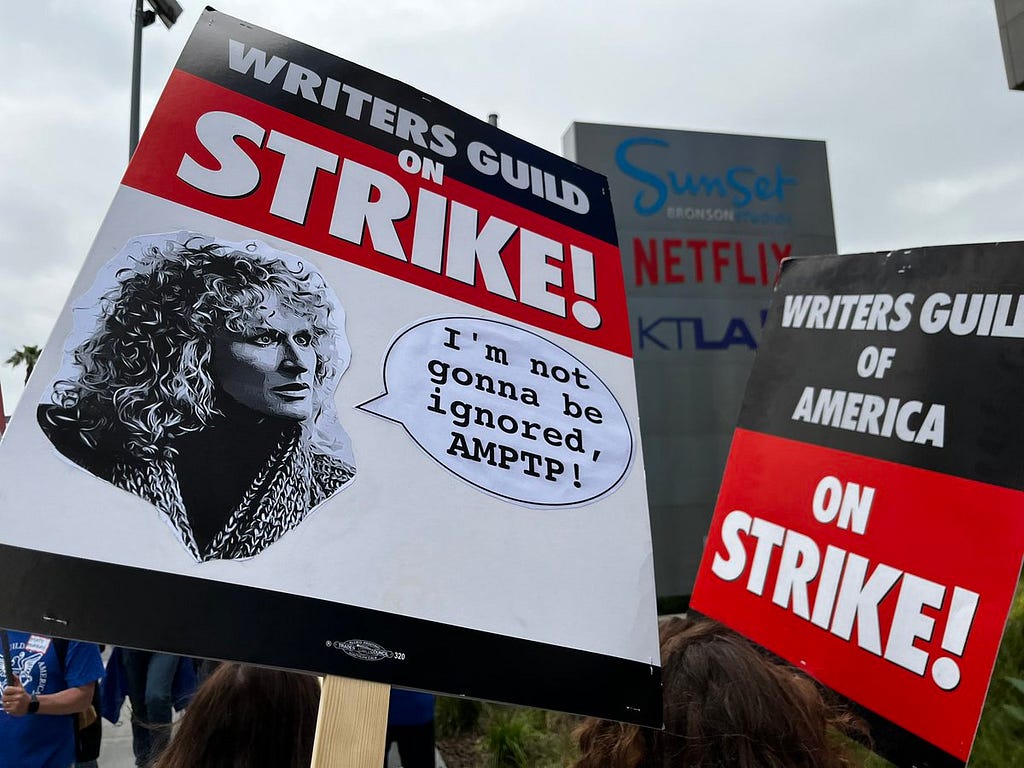Read stories from Hollywood writers about how the companies have broken the business.

Recently, the WGA on its website began hosting a series of anonymous statements from screenwriters and television writers. Reading through them clearly conveys how broken the current system is. Here are a few of the anonymous statements.
TV SHOWRUNNER
I have been making television for 20 years. For 19 of those years, I made it with a writers’ room in place during preproduction, production and post production. While all for broadcast networks, I made series with six-episode orders, 22-plus episode orders, and everything in between.
In 2022 I made two shows for two different streaming services. Both were 8-episode straight to series orders. In both cases a writers’ room was hired for a finite number of frustratingly negotiated weeks that ended before production started. I was told there was not enough room in the budget of these $3- and $5-million-dollar-an-episode shows to pay a writing staff for the time needed to do our work. To make fewer episodes does not mean the process changes and writing suddenly ceases to exist the whole way through.
On the last show I made, I spent three months living in Brooklyn during production, working seven days a week, 12-hour days on average, in a desperate attempt to succeed with the limited tools provided. I was given the choice of having one writer on set with me or a producing director. These are two very different jobs, but I had to pick. I chose a talented writer and still, the workload of writing plus production demands required more hours than we had available. I got the job done, quite frankly, by making myself unwell. This is unsustainable.
We have asked for the writing staffs we need. We have asked to have them work for the amount of time necessary. We have been told no. Now we need the Guild to set these minimum terms to ensure we have the staffs we need for the time needed to make our shows.
— —
TV SHOWRUNNER
I have been a member of the WGA for over 20 years, and have written for, produced, and created shows for just about every broadcast network and streaming entity, most recently on an overall deal with a streaming company. In the past few years, things have drastically changed. Last October, I was given an ultimatum. In order for my overall deal to be renewed, I needed to “help with strike planning” by accelerating the time frame on a new series I had in development. Even if I had been willing to compromise my values to do this, it was logistically impossible. Due to their unwillingness to pay for writers other than myself to be on set, there was no way I could simultaneously run a new room on an accelerated time frame while also being the sole writer/producer/showrunner on my current show.
I said no. They called my bluff and cut my deal. But, once I was done shooting, they still wanted that limited series. So, they ordered a mini-room and a series document. In this mini-room, I was given one additional writer. And when I asked for a writers’ assistant to be hired, they said no, explaining, “We don’t want to set a precedent for having writers’ assistants in mini-rooms.”
I lost it. No writers’ assistant? Not only does the lack of staff make it IMPOSSIBLE to do the work of inventing the world of a TV show, a process I have spent twenty years learning to do, it makes it impossible for anyone to learn and train from me.
Tech companies come along with data models that they think improve the way content is distributed. Fine. But they show no understanding, respect, or appreciation for the way worlds are built in writers’ rooms. The way the television stories people love are actually told. We had a system that worked beautifully and I have personally witnessed them breaking it. It’s time to stop and say enough.
— —
SCREENWRITER
One of the things feature writers are fighting for this strike is to finally make the studios admit that it doesn’t matter if you’re writing for the big screen or streaming. The work is the same, so the pay should be too.
Last year, my writing partner and I were asked to pitch on a big, legacy property at Disney. An experienced producer and name talent were already attached. It felt like a big opportunity! We spent months developing our idea and pitching it to talent, executives, re-pitching wherever needed, and we were finally offered the job. Except… when the initial offer came in, not only was it nowhere close to our quote, it seemed to be below what I understood to even be the guild screenplay minimums. Well, it turned out since it was for Disney+ we had actually been pitching on a “TV movie” the whole time and no one told us there’s a huge contractual difference.
Currently, a giant loophole the studios can use to pay screenwriters less is to call a streaming movie “Made For TV” which has lower base rates than theatrical movies.
The distinction comes with far worse rights for rewrite jobs as well. On a different job I only found this out in arbitration, when I was told my work wouldn’t be credited because it didn’t reach the much higher 50% threshold that TV movies have versus theatrical features.
Some streamers currently choose to pay the higher rates for the time being to remain competitive in the market, or so they can choose to distribute it in theaters. But we all know how long higher pay lasts when it’s at the studios’ discretion.
It’s not just the money they’re paying you up front. Residuals are lower for streaming features, more akin to an episode of television than a movie.
So, among the many things we’re fighting for this strike, screenwriters need the studios to admit a screenplay is a screenplay regardless of where it ultimately ends up.
— —
COMEDY-VARIETY WRITER
When I created a show for one of the smallest basic cable channels, my entire staff enjoyed the protections of a Guild contract: weekly minimums, 13-week guarantees, and a residuals formula that meant we shared in the success of our show. But when I created an almost identical show for a massive international streaming platform, I was told by the line producer that we had none of those protections, and that producers could do “whatever we want with writers.” He literally bragged that he could pay us a dollar a week if he wanted to. When the show finally aired on the largest streaming platform in the world, my first year of residuals totaled less than 1% of what I had previously received working for the smallest channel in basic cable. It’s unconscionable and unsustainable for comedy writers in streaming to receive none of the protections and a fraction of the compensation that writers on linear television receive, despite doing the exact same work.
From the WGA:
Throughout this negotiating cycle, writers have been sharing our personal experiences working over the past several years under unsustainable conditions. These stories highlight precisely why we are on strike and why our proposals are so critical to the future of this profession. They highlight why every proposal matters to screenwriters, to comedy-variety and other Appendix A writers, to episodic writers, to emerging writers, and upper-level writers — to all writers.

For more Why We Strike stories, go here.
For the latest updates on the strike and news resources, go here.
Why We Strike was originally published in Go Into The Story on Medium, where people are continuing the conversation by highlighting and responding to this story.
Go to Source
Author: Scott Myers
